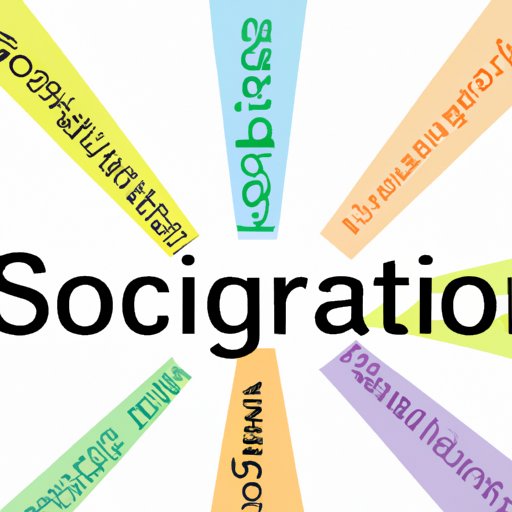Introduction
Sociology imagination is a term coined by American sociologist C. Wright Mills to refer to the ability to think critically about the relationship between individual experiences and larger social forces. It is an essential tool for understanding the complex dynamics of society and can be used to inform personal and professional decisions. In this article, we’ll explore the definition of sociology imagination, its history, impact, application, role in social change, and benefits.

Exploring the Definition of Sociology Imagination
So, what is sociology imagination? According to Mills, it is “the vivid awareness of the relationship between experience and the wider society.” In other words, it is the capacity to understand how one’s own life and experiences are shaped by larger social forces. This form of thinking requires a critical examination of power structures and their influence on individuals and societies.
How does sociology imagination differ from other forms of thinking? While traditional forms of thinking focus on individual experiences and outcomes, sociology imagination allows us to see beyond our immediate circumstances and consider how different social forces interact to shape our lives. For example, while traditional thinking might lead us to believe that poverty is caused by laziness, sociology imagination encourages us to consider the role of systemic inequality in creating and perpetuating poverty.

Examining the History of Sociological Imagination
The concept of sociology imagination was first introduced by C. Wright Mills in his 1959 book The Sociological Imagination. In this seminal work, Mills argued that sociologists should strive to make connections between individual experiences and larger social forces in order to better understand the complexities of human behavior. He believed that this type of thinking could help to bring about social change by highlighting the underlying causes of social problems.
Since then, the concept of sociology imagination has been further developed by many other sociologists. For example, Pierre Bourdieu argued that sociology imagination is a necessary tool for understanding the dynamics of power and privilege in society, while Jürgen Habermas emphasized the importance of using sociology imagination to analyze the effects of modernization on individuals and societies.

Analyzing the Impact of Sociological Imagination on Society
Sociology imagination has had both positive and negative impacts on society. On the positive side, it has enabled people to gain a deeper understanding of the social forces that shape their lives and to recognize the need for social change. It has also encouraged people to think critically about the power dynamics at play in their lives and to question authority.
On the other hand, sociology imagination has been criticized for its tendency to oversimplify complex social issues. Many sociologists have argued that too much emphasis on individual experiences can lead to a narrow view of the world and can prevent people from seeing the bigger picture. Additionally, the use of sociology imagination can lead to feelings of alienation and despair as people become aware of the injustices in the world.
Investigating the Application of Sociological Imagination
So, how does sociology imagination impact everyday life? By allowing us to look beyond our individual circumstances and to understand the broader social forces at work, sociology imagination helps us to make more informed decisions about our lives. It can also help us to better understand the perspectives of those around us and to empathize with their experiences.
For example, if you are considering changing your job, sociology imagination can help you to consider not only your own needs but also the implications of your decision on the larger society. By taking into account the economic, political, and cultural forces at play, you may be able to make a more informed decision about your career path.
Here are some other examples of how sociology imagination can be applied in everyday life:
- Understanding the impact of racism on educational opportunities
- Analyzing the role of gender norms in forming relationships
- Examining the influence of corporate power on consumer choices
- Exploring the effects of globalization on local economies
Understanding the Role of Sociological Imagination in Social Change
Sociology imagination has played an important role in social movements throughout history. By encouraging people to think critically about the power structures that shape their lives, sociology imagination has helped to raise awareness of social injustices and to mobilize people to take action.
For example, the civil rights movement of the 1960s was fueled by sociology imagination. People began to recognize the systemic racism that was embedded in American society and to challenge the status quo. This led to the passage of the Civil Rights Act of 1964, which outlawed discrimination based on race, color, religion, sex, or national origin.
Today, sociology imagination continues to be an essential tool for social change. It enables us to identify the root causes of social problems and to develop effective strategies for addressing them. Additionally, it can help us to understand the perspectives of others and to bridge the gaps between diverse groups.
Discussing the Benefits of Sociological Imagination
Sociology imagination can have numerous benefits for individuals, organizations, and society as a whole. Here are some of the most notable advantages of this form of thinking:
- Enhancing personal and professional relationships: By understanding the social forces that shape our lives, we can more effectively navigate interpersonal relationships and build meaningful connections with others.
- Encouraging critical thinking: Thinking critically about the social forces that shape our lives can help us to become more aware of our own biases and to make more informed decisions.

Comparing and Contrasting Different Perspectives on Sociological Imagination
While most sociologists agree that sociology imagination is an important tool for understanding the complexities of society, there is a great deal of debate over the best approach to this type of thinking. Two of the most prominent perspectives are Marxism and postmodernism.
Marxism emphasizes the importance of understanding the economic forces that shape our lives, while postmodernism focuses on the influence of culture and language. Functionalism, on the other hand, argues that society is composed of distinct parts that work together to maintain stability. Finally, conflict theory suggests that power struggles between different social groups create social change.
Conclusion
In conclusion, sociology imagination is an essential tool for understanding the complexities of society. It encourages us to think critically about the power structures that shape our lives and to recognize the need for social change. Additionally, it can be used to enhance personal and professional relationships and to encourage critical thinking. While there is debate over the best approach to sociology imagination, all sociologists agree that it is an invaluable tool for understanding the world around us.
(Note: Is this article not meeting your expectations? Do you have knowledge or insights to share? Unlock new opportunities and expand your reach by joining our authors team. Click Registration to join us and share your expertise with our readers.)
